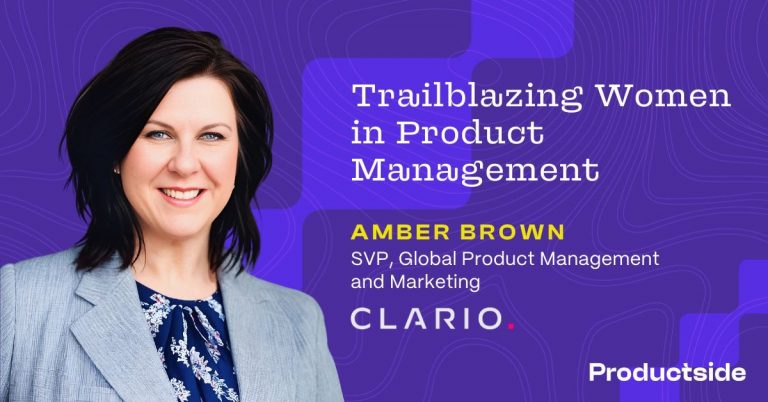
For our next Women in Product Management Series installment, I connected with Jennifer Marx, Vice President of Product Management at Synthetaic.
TLDR
- Jennifer studied to work in finance but ended up in technology, which resulted in her interacting with software users & buyers, acting as the voice of the customer (VOC).
- Jennifer is now the Vice President of Product Management at Synthetaic, an end-to-end AI company. “I had never worked directly on an AI product before, nor had I worked in a startup, but the more it scared me, the more I knew it’s what I had to do next.”
- Jennifer shares her product management wisdom, including being authentic and decisive, and how PM leaders should focus on having a servant-leadership attitude.
Nicole: Jennifer, it’s a pleasure to meet you. Thank you for sharing your journey and inspiring more women to consider Product Management.
Jennifer: Thank you for having me. Seeing more and more women venture into Product Management is not an accident. I believe women have an innate sense for the skills that make you a good Product Manager, like empathy, listening, negotiation, compromise, and making good, balanced decisions.
Let’s jump right in then to what advice you would give women considering Product Management as a career.
Well, the advice is the same for both men and women – in my view. Here’s what it takes to be a good Product Manager: don’t be afraid to be your authentic self. If your career brought you into Product Management, you likely already have the unique skills. You want to be a decision-maker. You want to be a leader. You want to blaze trails and do things nobody has done before. If you find yourself on that track, trust yourself to be passionate, but remember to be a good listener, perceptive, and caring. Those aren’t attributes that make you weak; they make you a better Product Manager. But remember, you’re the one in the room who will make decisions and set the direction. Product Managers need to weigh the options and make decisions. While it’s good to read a room and conform to make the team most productive, don’t let it change you. Be your authentic self.
That is so great! So, tell me, what brought you to Product Management?
I went to school for economics to be a banker or something in finance. Fortunately, I ended up in technology. I started working at The Mark Travel Corporation as a junior associate of product management/product marketing, working with the people who built the software. I used the software and found bugs. I wrote insightful bug details regarding where I thought the error occurred, which led the IT department to ask me to help them document features. That’s how I wound up as a business analyst. Eventually, that IT department spun off into its technology offering, Trisept Solutions. My titles varied: Product Manager, Senior Business Analyst, and Enterprise Integration Manager. No matter the title, I was always working with the software users, those customers’ business leadership, and their business goals from a business perspective. I brought that all back to engineering to discuss the options and drove the best decisions based on the ROI of the features.
Over the ten years, I was at Johnston Controls, I held positions leading a PO team, working with advanced R&D doing VOC work, but mostly I was in program management. At JCI, program management lives between a traditional product management organization and a traditional engineering organization. I understood that space, and my career advanced to a senior leadership position. But I wasn’t fulfilled because, in program management, I wasn’t making the product decisions. I knew I wanted to do software product management again in a small enough company where you can make a decision and see its fruition within days or weeks, not years. I had never worked directly on an AI product before, nor had I worked in a startup, but the more it scared me, the more I knew it was what I had to do next.
And that’s how you ended up at Synthetaic, a relatively new company. And even more recent is your title of Vice President of Product Management. Congratulations on your promotion! That’s a unique journey to have experience across the board, from a startup to a Fortune 500 company, to see how rules change within those environments. What are some lessons that you learned through all this?
A vital lesson I’ve learned is that you need to be decisive. You must be thoughtful and have information, not hearsay or a passionate customer complaint. Making a decision quickly is important to keep everybody moving forward. Product Managers can take days, if not weeks or months, to decide and provide engineering direction. Meanwhile, engineering is building something that whole time – and if it’s the wrong thing, it could be a waste of time, money, and opportunity cost. Be decisive, but it is okay to change your mind based on new information. Also, remember, sometimes it’s the thing you say no to that’s actually the most important decision you make. What are you putting in scope, and what are you articulating as out of scope? That’s a mindset that not all Product Managers understand. They put all their effort into describing the end result of what they are looking for without thinking about it from the engineering perspective or even the customer perspective. Avoid over-engineering things. Avoid adding ‘nice to have’ features. Instead, get to market faster and get product market fit information back from customers. That is the lesson of progress over perfection, always.
Yes, I think that’s the lesson we need to learn over and over again in our careers.
Tell me what you like most about Product Management and what you find most challenging about Product Management.
That’s the duality of it: what is most challenging is also what I love. There are very few times when there is an obvious win/win when all the features the customer wants are exactly what engineering can deliver within the timeframe you need. A few times, the budget, timeline, and scope align. The Product Manager negotiates the right decisions regarding where to draw those lines. That’s what I love, and it’s the most challenging. Sometimes you’re not making anybody happy. Engineering feels overwhelmed because you’re pressuring them for timelines. The business leadership is disappointed because it’s taking longer to market. The customer may not be happy because you’re only delivering 4 out of the five things they wanted. Yet you know at the end of the day, you made the best decisions for the business, the engineering team, and the customer. At the moment, it can feel like a thankless job. You have to get joy from making that decision and feel good that you made the right one.
Plus, it’s so much fun to lead and develop something that’s never been there before, whether it’s a feature or a whole new product. I’m lucky enough to be in an industry and in a very creative company. I love that. I love thinking about the user’s experience and the design aspect of Product Management. I have so much fun. It’s so important to enjoy what you do.
That’s a great answer. I’ve never had the same answer to those two questions, but it’s exciting to see your passions and the challenges come together like that.
Now, when hiring for your team, which you got to do a lot at Synthetaic as you recently built up the team there, what are you really looking for when hiring Product Managers?
I look for the things I can’t teach. I can teach you about the product. I can teach you the customer. I can teach you the technology. What I can’t teach you is a servant leadership attitude. Do you want to be the person who is both in charge of the decision and accountable for the decisions that you make? Are you a good listener? Do you have superior communication skills? Negotiation skills? Those things are hard to teach if you don’t have the personality and natural skills with these attributes already at a high mark. I’ve had people I’ve molded, but if someone is argumentative or overbearing, then I’m likely not going to teach you to be the person who is leading the discussion while making space for collaboration to come up with the best decision.
Going back to your advice earlier about being your authentic self. If your authentic self is someone who will take over the room and not listen and learn, then maybe that’s not the right person for the team.
Exactly. To be fair, I’ve also seen times when the Product Manager in charge in the room isn’t taking enough control. They let things get out of control in a sprint planning discussion or even with a customer, and suddenly scope is getting added that isn’t truly important. You must demonstrate negotiation and diplomacy while leading the discussion and deciding what action to take. You have to have the right balance. A Product Manager that’s not controlling the conversation openly and inclusively doesn’t help. The best products are built when you have everybody contributing to the conversation. As a Product Manager, I hear all that information, and I set the direction. That’s why I love Product Management.
I love the passion you have for Product Management. Besides being authentic and having fun, is there a motto or a guiding principle you live by?
What I want to live by… I’m not saying I always do it, but what I aspire to do is be thankful. Say, thank you. Be compassionate. And listen as much as I talk, but lead. Listen but lead. That’s what I aspire to do.
It sounds like you’re always learning and growing. And it is called a guiding principle. It’s ahead of us, and we’re going after it. Well, thank you so much, Jennifer. It was such a pleasure hearing about your journey and your passion.


